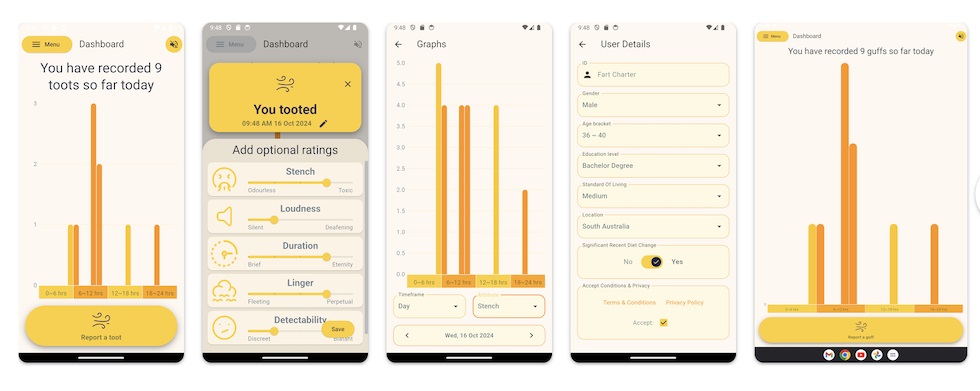Australian researchers develop ‘Chart Your Fart’
Certainly, one of the main issues affecting most people in today’s society is a sedentary lifestyle characterized by stress and irregular work-life balance. When you combine it with terrible eating habits, you have the makings of a health catastrophe!
Because of this, as reported here, many people today experience poor gut health and its crippling consequences. As a result, a group of Australian researchers have developed a somewhat odd and perplexing method for enhancing gut health: monitoring your fart!
According to CSIRO research, the average person passes wind between 7-20 times per day, though this can vary significantly based on diet and activity levels. This finding gains additional context from a 2021 CSIRO gut health study which revealed that more than 60% of Australians reported excessive flatulence, with over 40% experiencing it most days. These statistics highlight the widespread nature of digestive health concerns in the population.
As puzzling as it may sound, a report by Interesting Engineering claims that the Commonwealth Scientific and Industrial Research Organisation (CSIRO), Australia’s national science agency, has initiated this strange project with the goal of delving deeply into the science of gut health using data gathered from people.
CSIRO scientists have created an app called Chart Your Fart that allows Australians over 14 to record and monitor their flatulence for three days. The researchers claim that this effort advances our understanding of gut health by employing data from the app.
Instead of just recording flatulence, the app‘s algorithms are designed to analyze its characteristics in depth. It asks users to rate their farts on a variety of criteria, including stench (odorless to toxic), duration (short to eternity), detectability (discreet to blatant), loudness (silent to deafening), and smell longevity (fleeting to permanent).
The app’s practical benefits are already becoming apparent through user experiences. One participant, Heather, who previously attributed her frequent flatulence to “coming from a farty family,” discovered valuable patterns in her digestive health through the app. By tracking her daily output, she identified specific triggers in her diet, particularly noting how certain foods like croissants, pasta, and bread led to increased gas production. This insight has prompted her to make more conscious dietary choices.
Using the Chart Your Fart app is straightforward and user-friendly. Participants can log their experiences in real-time, with the app designed to capture data at the moment it occurs. Users simply open the app when they feel flatulence coming on and can quickly input their observations. This immediate recording helps ensure accurate data collection and makes the tracking process more manageable for participants.
“Passing wind is a natural occurrence and a sign that our digestive system is working as it should, to expel excess gas that is produced from breaking down and processing the food we eat,” said CSIRO research dietitian Megan Rebuli. “Different foods, medical conditions, or even the way we chew or swallow can impact how our body processes the gas, leading to different smells, frequency, or volume,” she added.
The CSIRO team emphasizes that gut health serves as a crucial indicator of overall wellness. Dr. Emily Brindal and her team are particularly interested in establishing clear benchmarks for what constitutes “normal” patterns in digestive health. This research aims to help people better understand when their symptoms might indicate underlying issues and when they fall within typical ranges. The data collected could prove invaluable in developing more targeted approaches to digestive health management.
“Research is only as good as the data we have, and we want to work with as much of our diverse Australian community as we can to drive innovation in health and wellbeing research,” said Dr. Emily Brindal, project lead, and CSIRO Behavioural Scientist while explaining the purpose of the project.
The project also addresses an important cultural aspect of digestive health. While many people find the topic embarrassing, CSIRO dietitian Megan Rebuli emphasizes that there’s no need for shame. The project aims to normalize these discussions, encouraging people to be more open about their digestive health and seek help when needed. As one participant aptly put it, “Nobody needs to be shy about it – everybody farts, right?”

